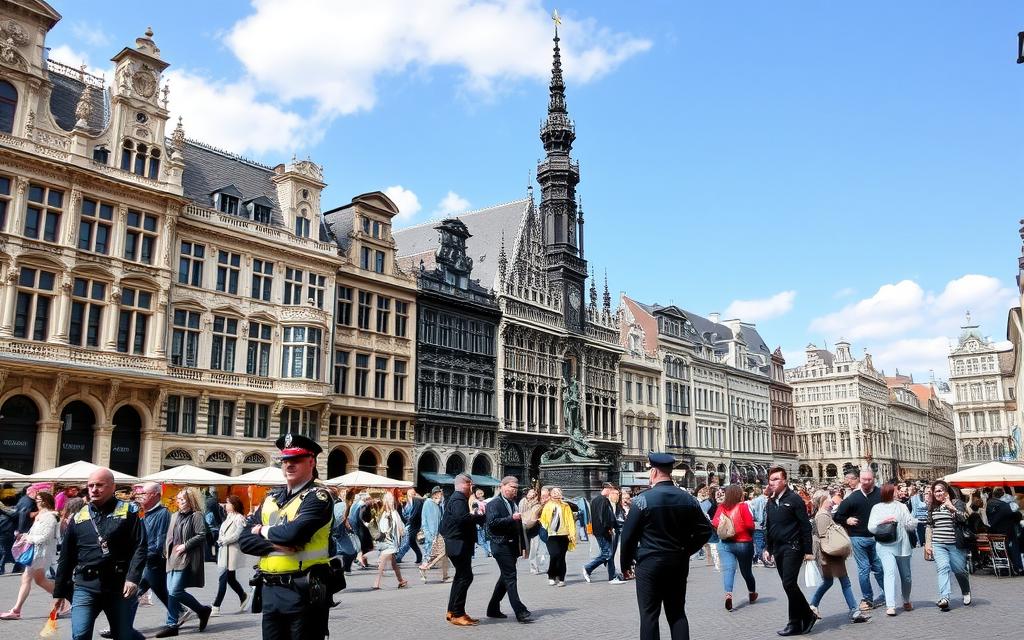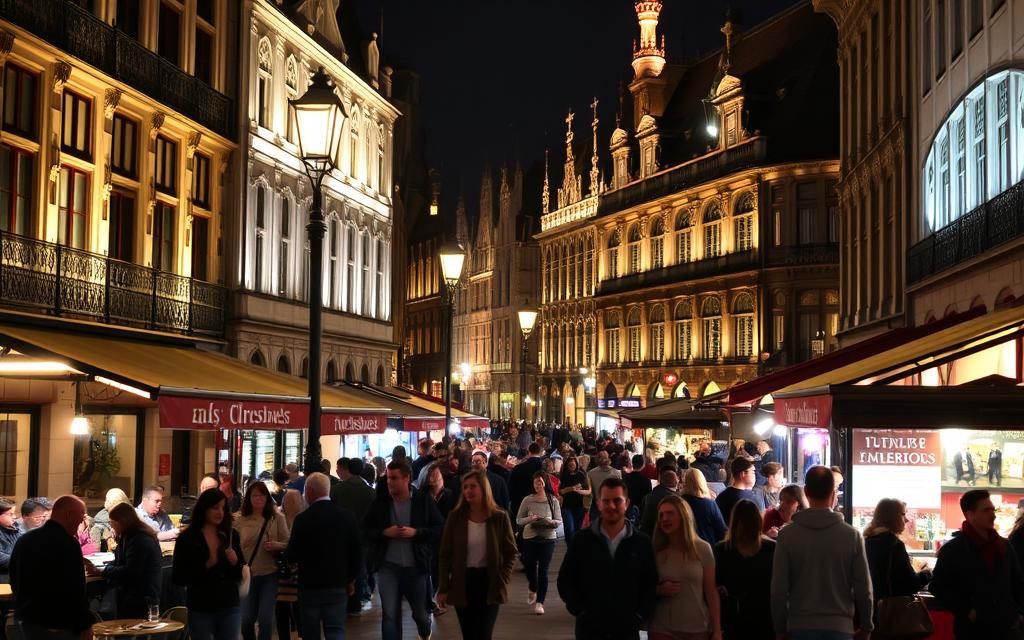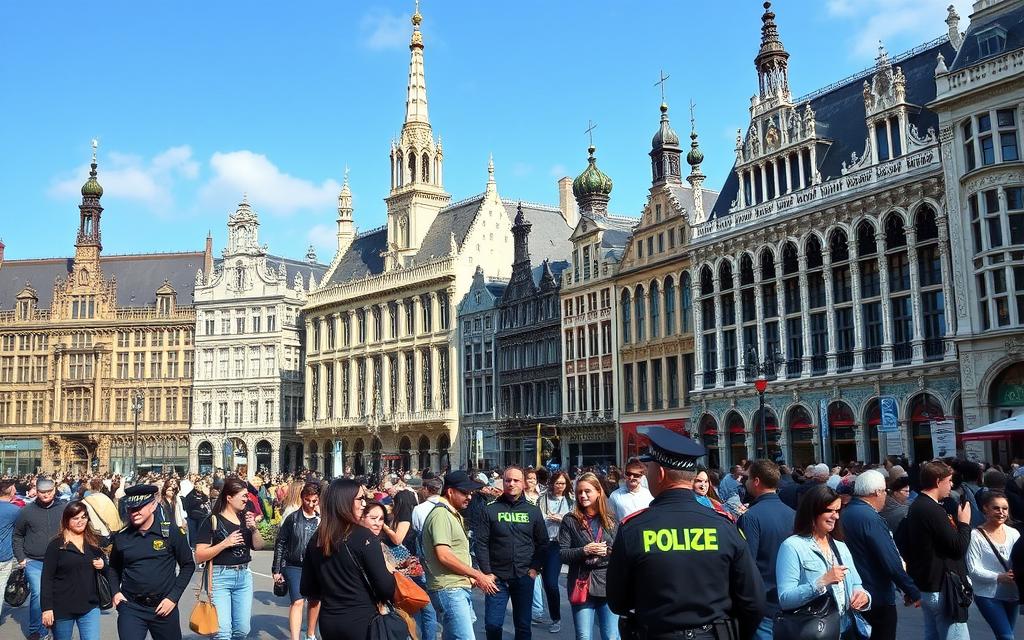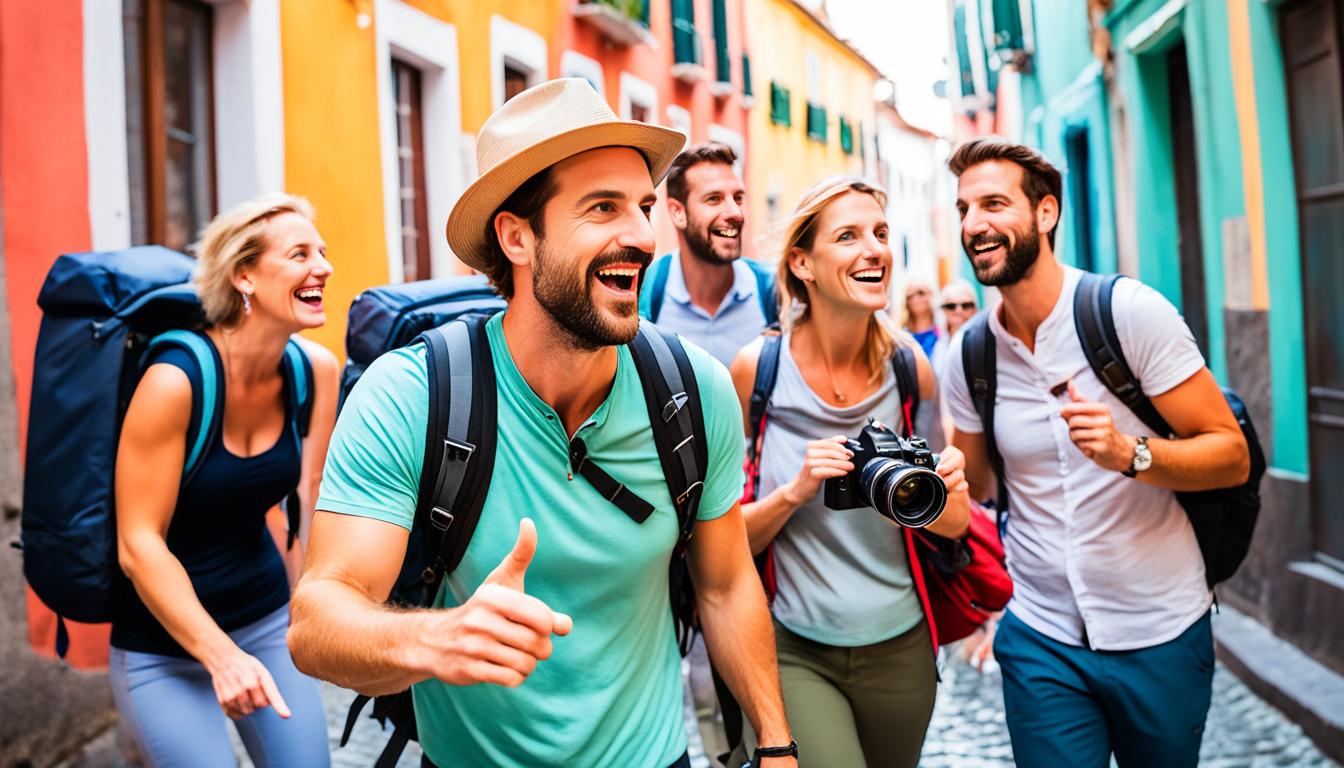Brussels, the capital of Belgium, is a lively city with a rich history and culture. It’s also the heart of the European Union. Every year, it welcomes up to 9 million visitors, offering many experiences. Knowing about Brussels city safety is key for a safe and enjoyable trip.
Belgium is ranked 20th on the Global Peace Index, showing it’s generally safe. But, Brussels has areas where petty crimes like pickpocketing happen a lot, especially in busy places. It’s important for visitors to be careful and watch their belongings.
Travel advisories for Brussels tell tourists to be cautious, especially in crowded spots and on public transport. Following safety tips and checking the latest travel advice from your government will help. This way, you can explore Brussels’s many attractions without worry.
Overview of Brussels: A Quick Introduction
Brussels, the capital of Belgium, is a top destination in Europe. It’s known for its rich history, vibrant culture, and many attractions. The city’s mix of old-world charm and modern life makes it a favorite among tourists.
Brussels is also known for being a safe place for visitors. It offers a welcoming environment for everyone.
Brief History of Brussels
Brussels has a long history, filled with royal influences and architectural breakthroughs. It started in the medieval times and has become the heart of European governance. The city is home to important institutions like the European Parliament and the European Commission.
This history is seen in its landmarks and structures. It shows a fascinating mix of old and new.
Cultural Significance and Attractions
Brussels is full of culture, from royal gardens to a lively nightlife. It has attractions like the Parlamentarium, Mini-Europe, and the Fin-de-Siecle Museum. These spots attract millions of visitors every year.
These attractions showcase Brussels’ artistic side and add to the city’s charm. They also help make the city safer for tourists.
The people of Brussels are friendly and welcoming. This makes the city a safe and welcoming place for visitors. The city has good public transport and a strong police presence. It also has modern healthcare and emergency services.
Safety Statistics: Analyzing the Data
It’s important for tourists to know about safety in Brussels before they go. We’ll look at crime rates in Brussels and compare them to other European cities. This will give you a clear picture of how safe Brussels is.
Crime Rates in Brussels
Brussels has seen both good and bad in its crime rates lately. Petty crimes like pickpocketing and theft are common, especially in busy tourist spots. There have also been violent crimes near major train stations, linked to gangs and drug trafficking.
But, some areas in Brussels are very safe. These neighborhoods are well-protected and have low crime rates. They offer a safe place for both locals and visitors.
- Brussels Gare du Nord
- Brussels Gare du Midi
Comparison with Other European Cities
Brussels’ crime rates are moderate compared to other European capitals. The Safe Cities Index 2021 shows Brussels does well in some areas like infrastructure and digital security. But, it faces challenges from environmental and personal safety threats.
Some cities like Copenhagen, Toronto, and Singapore are safer than Brussels. But Brussels is still safer than many European cities. The Global Peace Index shows Belgium is safer than the UK and the USA.
“The Safe Cities Index also introduced a new pillar in 2021: environmental security, reflecting the evolving landscape of urban safety post-pandemic.”
In summary, Brussels has crime issues but also safe areas. Local efforts and safe neighborhoods make it a good place for tourists.
Areas to Avoid: Where Not to Go
When you visit Brussels, knowing which areas to avoid is key. The city’s safety score is 60%, showing it’s mostly safe. Yet, some spots are safer than others.
High-Crime Neighborhoods
Be extra careful in places like Molenbeek, Schaerbeek, Anderlecht, and parts of Marollen. Molenbeek is known for its street art but also for drug issues. Schaerbeek and Saint-Josse-ten-Noode have more petty crimes. It’s wise to steer clear of these areas, especially at night.
The red-light district, Rue d’Aerschot, is known for its sex shops and clubs. This area has more police to handle small crimes and scams. Being alert here can help keep you safe while exploring Brussels.
Tips for Staying Clear of Trouble
Here are some tips to stay safe in Brussels:
- Avoid dimly lit streets: Choose bright and busy areas, especially at night.
- Stay informed: Keep up with local news to know about any risky areas during your visit.
- Secure your belongings: With pickpocketing common, keep your stuff close and safe, especially in crowded spots.
- Know emergency contacts: The European emergency number, 112, is ready for help if you need it.
| Neighborhood | Known Issues | Tips |
|---|---|---|
| Molenbeek | Drug trafficking | Travel in groups, stay in well-lit areas |
| Schaerbeek | Petty crimes | Be vigilant, avoid night travel |
| Saint-Josse-ten-Noode | Safety concerns at night | Use main roads, avoid isolated places |
| Rue d’Aerschot | Petty crime, scams | Stay cautious, keep belongings secure |
General Safety Tips for Tourists
Brussels is a lively city with lots to see and do. But, it’s key to stay safe and aware. Here are some tips to help you have a safe and fun trip.
Staying Alert: Your Personal Safety
Being alert is crucial for a safe visit to Brussels. Carry your belongings securely, like in a cross-body bag. This makes it harder for thieves to grab them. Don’t show off expensive items or lots of cash.
Keep important documents like your passport in a hotel safe. Carry photocopies instead.
Using Public Transportation Wisely
The public transport in Brussels is mostly safe. But, it’s smart to stay alert to avoid trouble. Pickpockets often target busy spots, like Gare du Midi. Always watch your stuff and know your route before you go.
Don’t get too caught up in your phone in crowded areas. This helps you stay aware of your surroundings.

- Use well-lit, busy areas when commuting late at night.
- Avoid engaging with overly friendly strangers who might be using distraction techniques.
- Keep a firm grip on your belongings, especially in crowded areas like metro stations and buses.
By following these tips, you can enjoy a safe and memorable trip. Make the most of your time in this beautiful European city.
Health and Medical Safety in Brussels
When you travel to Brussels, keeping your health in mind is key. It’s important to stay current with vaccination advice and know where to find emergency services. Brussels has a good healthcare system, ready to help tourists when they need it.
Vaccination Recommendations
Before you go to Brussels, check that your vaccinations are current. You’ll want to make sure you have shots for measles, mumps, and rubella (MMR), diphtheria-tetanus-pertussis, and flu. Even though Belgium is modern, it’s wise to protect against bug bites and tick-borne illnesses like Lyme disease, especially in rural spots.
- Use insect repellents with 20% or more DEET.
- Wear clothes treated with permethrin to fight off insect bites.
- Use sunscreen with at least SPF 15 and stay in the shade when the sun is strong (10 a.m.–4 p.m.).
“Using sunscreen is not just for the beach. Brussels can have high UV indices during summer, making protection crucial.”
Emergency Services and Hospitals
Brussels has reliable emergency services ready to help when you need it. Call 112 for police, fire, and ambulance help. Also, keep numbers like 100 for fire and medical emergencies, and 105 for the Red Cross handy.
Brussels safe neighborhoods have top-notch hospitals. Places like University Hospital Saint-Luc, Erasmus Hospital, and CHU Brugmann offer excellent care. They can handle everything from simple check-ups to serious emergencies. Plus, healthcare costs are fair, so tourists can get good medical help without breaking the bank.
| Emergency Numbers | Service Provided |
|---|---|
| 112 | Police, Fire, and Medical Emergencies |
| 100 | Fire and Ambulance Services |
| 105 | Red Cross |
Staying safe while traveling is important. Follow traffic rules, choose safe ways to get around, and steer clear of dangerous areas. This way, your visit to Brussels will be safe and enjoyable.
Local Laws and Regulations: What You Should Know
Knowing the local laws and customs is key to staying safe and respectful in Brussels. This part covers important topics like the legal drinking age, drug laws, and what’s considered polite for visitors. These tips help you stay safe by knowing how to follow the rules and social norms.
Legal Drinking Age and Drug Laws
In Belgium, you can drink beer and wine at 16, but spirits are for those 18 and older. The rules are strict, so always carry ID when buying alcohol. Drugs are also a big no-no, with serious penalties for possession or use. It’s important to follow these laws to avoid trouble and have a safe trip.
Customs and Etiquette for Tourists
Knowing the local customs and etiquette in Brussels can make your visit better. Belgians value punctuality and politeness, so be on time and friendly. A firm handshake and eye contact show respect.
Dining manners are also important. Wait for the host to start the meal and keep your hands visible. Saying “bon appétit” before eating is a nice touch. Following these customs makes your trip more enjoyable and helps keep Brussels safe and welcoming.
- Be punctual for social and business meetings
- Always greet with a firm handshake and maintain eye contact
- Follow specific dining etiquette, like waiting for the host to start the meal and keeping hands visible
- Say “bon appétit” before eating
In short, respecting local laws and customs makes your visit to Brussels safer and more enjoyable. By following these tips, you can fully enjoy the city while being respectful and careful.
Transportation Safety: Getting Around Brussels
Brussels has a well-organized public transport system. It includes buses, trams, and metros. This makes traveling around the city easy. But, it’s important to stay safe while traveling.
Public Transport Safety Guidelines
The STIB/MIVB runs Brussels’ public transport. It covers 147km of tram lines. Here are some tips for safe travel:
- Stay alert, especially in crowded places like metro and train stations. Pickpockets are common there.
- Use the BRUPASS for cheaper and safer travel on buses, trams, metros, and trains.
- Choose your train class wisely. Buy tickets online to avoid scams.
- Be careful during busy times to avoid petty crimes.
- Remember, pedestrians aren’t always right of way. Always watch out while crossing streets.
Taxi and Ride-Sharing Services
Taxis and ride-sharing are also safe ways to get around Brussels. Here are some tips:
- Only take official taxis like Taxi Verts. They are safe and regulated, including for disabled travelers.
- For ride-sharing, use apps like Uber. Always check the driver’s ID and the car’s details.
- Try car-sharing apps like Poppy and Cambio. They’re great if you have a European driver’s license. They offer hourly rentals for flexibility.
- Don’t take motorbike taxis. They’re riskier than cars or taxis. Always wear a seatbelt and sit in the back for safety.
By following these tips, your trip in Brussels will be safe and fun. Whether you use public transport or taxis and ride-sharing, you’ll be well-prepared.
Nightlife Safety: Enjoying Brussels After Dark
Brussels has a lively nightlife scene. It draws both locals and tourists with its bars, clubs, and cultural events. But, it’s important to stay safe after dark to enjoy your evening without worries.

Tips for Safe Night Out
When you’re out in Brussels at night, safety comes first. Here are some key tips to remember:
- Stay in well-populated and well-lit areas: Choose places like the city center or Saint-Géry. They’re lively and safe.
- Guard your belongings: Pickpocketing is common in crowded spots. Keep your valuables close and watch out for thieves.
- Use reliable transportation: Use trusted taxis or ride-sharing services. Walking alone at night is not recommended.
- Avoid high-risk neighborhoods: Places like Anneessens and Molenbeek have more crime. It’s best to avoid them at night.
- Emergency numbers: In an emergency, call the police at 101 or an ambulance at 112.
Recommended Safe Bars and Clubs
Brussels has many safe and popular spots for a great night out:
- Delirium Café: It’s famous for its wide beer selection and fun vibe. It’s perfect for beer lovers.
- Fuse Club: A legendary techno club known for its safety and great music.
- Le Cercle des Voyageurs: A cozy bar with a relaxed atmosphere and live music.
- À La Mort Subite: A historic bar offering authentic Belgian beer in a safe and charming setting.
By following these tips and choosing safe places, you can enjoy Brussels’ nightlife safely. Always be careful and plan your nights well to have a great time in this lively city.
Food Safety: Eating Well in Brussels
Brussels has a lively food scene with fancy restaurants and tasty street food. It’s key to focus on food safety to enjoy your meals.
Street Food Safety Tips
Street food lets you dive into local tastes and culture. But, following some safety tips is vital. Make sure the food is hot and cooked well. Bacteria grow fast in temperatures between 41°F and 135°F.
Also, check how clean the vendor is. They should handle food and tools safely. Always eat food that’s been cooked right away and keep cold items cold.
Recommended Restaurants with Good Hygiene
Brussels has many top restaurants known for cleanliness and great food. Places like Comme Chez Soi and La Roue d’Or are great choices. They focus on safety and serve amazing Belgian dishes.
Ixelles and Saint Gilles also have many safe places to eat. These areas are loved by food lovers who want to enjoy their meals safely.
Here’s a quick list of some top restaurants in Brussels:
| Restaurant Name | Location | Specialty |
|---|---|---|
| Comme Chez Soi | Boulevard, Adolphe Max | Luxury Belgian Cuisine |
| La Roue d’Or | Rue des Chapeliers | Traditional Belgian Dishes |
| La Truffe Noire | Avenue Louise | Truffle Specialties |
| Le Chou de Bruxelles | Rue de Florence | Personal Cuisine Focus |
Choosing these safe restaurants lets you enjoy Brussels’ food scene. Remember, food safety is important everywhere you eat.
Natural Disasters and Environmental Risks
Brussels has a mild climate, making it safe for tourists. But, it’s good to know about natural disasters and environmental risks. Brussels emergency services are ready to help, keeping everyone safe.
We’ll look at the weather and how Brussels prepares for emergencies.
Understanding Weather Patterns
Brussels has moderate weather all year. But, the weather can change suddenly. Rain is common from October to December.
It’s smart to check the weather forecast often. This helps you get ready for your trip. Even though severe weather is rare, heavy rain can cause floods.
Floods are a big problem in Europe. Climate change makes them happen more often. They can be very dangerous and costly.
Belgium must follow the Floods Directive to deal with floods. They use Flood Hazard Maps and Flood Risk Maps to manage these risks.
Emergency Preparedness in Brussels
Brussels emergency services are ready for any disaster. They have plans for floods, the biggest problem in Europe. The Floods Directive helps them manage rivers and use nature to reduce risks.
The city also wants people to know about emergencies. Tourists should learn about Brussels emergency services and how to contact them. Here’s a table to help you:
| Contact | Phone Number |
|---|---|
| Emergency Services (Police, Fire, Ambulance) | 112 |
| Non-Urgent Medical Help | 1733 |
| Weather Information | 02 244 1200 |
| Flood Information | 0800 338 96 |
Knowing the weather and emergency plans can keep you safe in Brussels. Use the resources from Brussels emergency services for a safe trip.
Cultural Sensitivity: Respecting Local Customs
When you visit Brussels, it’s important to show cultural sensitivity. This makes your visit enjoyable and respectful. Knowing about Belgian culture helps you connect better with the locals.
Belgium’s culture is a mix of French, Dutch, and German traditions. Each one adds its own flavor to the country’s customs.
Understanding Belgian Culture
Belgium’s culture is shaped by its languages. Over 55% speak Dutch, about 40% French, and a few German. But, most people also speak English well, making it easier for tourists to communicate.
It’s also important to know about religious and social norms. A 2019 survey showed that over 64% of Belgians are Christian. This diversity affects many cultural events and holidays, which visitors should respect and enjoy.
Communicating with Locals
When you’re in a new place, talking to people is key. Saying hello in French or Dutch shows you care about the culture. Simple words like “Bonjour” or “Dank u” can make a big difference.
- Bonjour: Good morning (French)
- Dank u: Thank you (Dutch)
- S’il vous plaît: Please (French)
- Alsjeblieft: Please (Dutch)
- Pardon: Sorry (French/Dutch)
Belgium is known for being polite, especially when eating out. Tipping 10-15% is common in restaurants and for taxi drivers. It’s a way to show you appreciate their service.
Respecting local customs makes your trip to Brussels better. It’s not just about fitting in. It’s about valuing and celebrating the unique aspects of each culture.
Resources for Tourists: Help at Hand
Visiting a new city can feel overwhelming. But Brussels has resources to make your trip smooth and fun. Whether you want to explore or need help, knowing where to find support is key.
Tourist Information Centers
Brussels has many Tourist Information Centers. They offer help on attractions, places to stay, and safety. You can find them in places like Grand Place, Sablon, and the European Quarter.
These centers give out free maps and brochures. The staff speaks many languages, helping you find out about local events and places to stay.
Emergency Contact Numbers for Tourists
Knowing emergency numbers is important for your safety in Brussels. The 112 number is the first to call in emergencies. Brussels Police is at 101 for urgent help.
Also, remember the local emergency medical services at 100 and the Fire Department at 100. Having these numbers ready ensures you can get help quickly, keeping you safe in Brussels.
Source Links
- https://bounce.com/guides/brussels/is-brussels-safe-to-visit
- https://fullsuitcase.com/is-brussels-belgium-safe/
- https://rachelsruminations.com/is-brussels-safe/
- https://www.latroupe.com/en/city-stories/what-not-to-do-brussels/
- https://euroculturer.eu/2023/04/05/a-beginners-guide-to-brussels/
- https://impact.economist.com/projects/safe-cities/
- https://www.gov.uk/foreign-travel-advice/belgium/safety-and-security
- https://www.axa-schengen.com/en/traveling-Europe-safety-tips
- https://housinganywhere.com/Brussels–Belgium/areas-to-avoid-brussels
- https://www.thebrokebackpacker.com/is-brussels-safe/
- https://www.mfa.gov.sg/countries-regions/b/belgium/travel-page
- https://wwwnc.cdc.gov/travel/destinations/traveler/none/belgium
- https://www.internationalinsurance.com/travel-to/belgium.php
- https://travel.state.gov/content/travel/en/international-travel/International-Travel-Country-Information-Pages/Belgium.html
- https://travel.gc.ca/destinations/belgium
- https://www.lonelyplanet.com/articles/getting-around-brussels
- https://qeepl.com/en/blog/is-brussels-safe-a-tourist-s-guide-to-safety-and-security
- https://www.worldnomads.com/travel-safety/europe/belgium/crime-hot-spots-in-belgium
- https://qeepl.com/en/blog/top-9-things-to-do-at-night-in-brussels-if-you-are-not-into-partying
- https://www.eurostar.com/us-en/destinations/brussels
- https://www.bonehealthandosteoporosis.org/patients/treatment/nutrition/
- https://uwyoextension.org/uwnutrition/newsletters/the-core-four-practices-of-food-safety/
- https://environment.ec.europa.eu/topics/water/floods_en
- https://academic.oup.com/eurpub/article/30/5/928/5512023
- https://wttc.org/Portals/0/Documents/Reports/2019/Crisis Preparedness Management Recovery-Crisis Readiness-Nov 2019.pdf
- https://www.vigilios.com/destinations/belgium
- https://www.expatica.com/be/living/integration/etiquette-in-belgium-108274/
- https://www.passporthealthusa.com/destination-advice/belgium/
- https://happytowander.com/brussels-travel-tips/
- https://bounce.com/guides/brussels/brussels-on-a-budget

